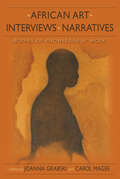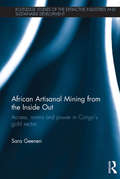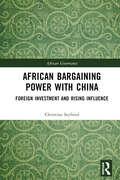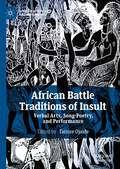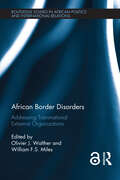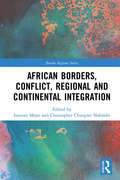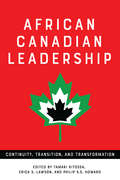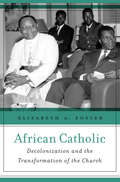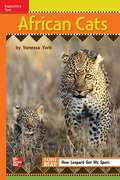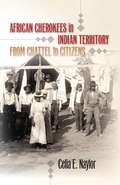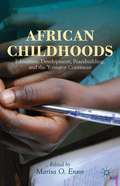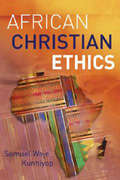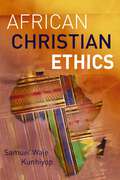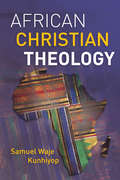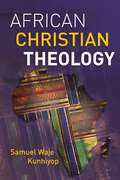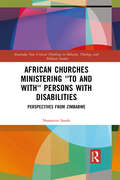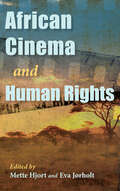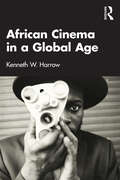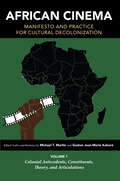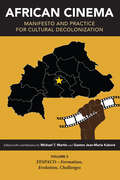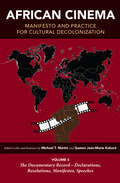- Table View
- List View
African Art, Interviews, Narratives: Bodies of Knowledge at Work (African Expressive Cultures)
by Joanna Grabski and Carol MageeJoanna Grabski and Carol Magee bring together a compelling collection that shows how interviews can be used to generate new meaning and how connecting with artists and their work can transform artistic production into innovative critical insights and knowledge. The contributors to this volume include artists, museum curators, art historians, and anthropologists, who address artistic production in a variety of locations and media to question previous uses of interview and provoke alternative understandings of art.
African Artisanal Mining from the Inside Out: Access, norms and power in Congo’s gold sector (Routledge Studies of the Extractive Industries and Sustainable Development)
by Sara GeenenArtisanal mining is commonly associated with violent conflict, rampant corruption and desperate poverty. Yet millions of people across Sub Sahara Africa depend on it. Many of them are living in eastern Democratic Republic of Congo (DRC), home to important mineral reserves, but also to a plethora of armed groups and massive human rights violations. African Artisanal Mining from the Inside Out provides a rich and in-depth analysis of the Congolese gold sector. Instead of portraying miners and traders as passive victims of economic forces, regional conflicts or disheartening national policies, it focuses on how they gain access to and benefit from gold. It shows a professional artisanal mining sector governed by a set of specific norms, offering ample opportunities for flexible employment and local livelihood support and being well-connected to the local economy and society. It argues for the viability of artisanal gold mining in the context of weak African states and in the transition towards a post-conflict and more industrialized economy. This book will be of great interest to researchers and postgraduates studying natural resources and development as well as those in development studies, African studies, sociology, political economy, political ecology, legal pluralism, and history.
African Bank Investments Limited (A)
by Lynn Sharp Paine Will HurwitzLess than a year after joining the board of African Bank Investments Limited (ABIL), the newest director finds himself in difficult discussions with other directors about removing the struggling company's CEO. The case is set in South Africa in mid-2014 as shares in ABIL, which traded on the Johannesburg Stock Exchange, are declining precipitously. The case describes ABIL's origins and evolution, including the acquisition and growth of its wholly owned subsidiary African Bank, a provider of unsecured loans to help individuals pay for expenses such as vehicle repairs, home renovations, funeral costs, medical bills, and education. As ABIL's profits rose and share price soared, it became the darling of analysts. However, when the South African economy turned sour, customers started defaulting on their loans, and ABIL and African Bank began to struggle. As ABIL's stock price dropped, the management team faced difficult questions about the company's lending practices, risk management processes, and plans to turn the business around. By 2014, the situation was grim, and pressure mounted from shareholders and market regulators for the board to take action. The case details the history of unsecured lending in South Africa, describes the regulatory, social, and legal contexts for the company and its business model, and explores the company's unique corporate structure and executive and director dynamics.
African Bank Investments Limited (B)
by Lynn Sharp Paine Will HurwitzLess than a year after joining the board of African Bank Investments Limited (ABIL), the newest director finds himself in difficult discussions with other directors about removing the struggling company's CEO. The case is set in South Africa in mid-2014 as shares in ABIL, which traded on the Johannesburg Stock Exchange, are declining precipitously. The case describes ABIL's origins and evolution, including the acquisition and growth of its wholly owned subsidiary African Bank, a provider of unsecured loans to help individuals pay for expenses such as vehicle repairs, home renovations, funeral costs, medical bills, and education. As ABIL's profits rose and share price soared, it became the darling of analysts. However, when the South African economy turned sour, customers started defaulting on their loans, and ABIL and African Bank began to struggle. As ABIL's stock price dropped, the management team faced difficult questions about the company's lending practices, risk management processes, and plans to turn the business around. By 2014, the situation was grim, and pressure mounted from shareholders and market regulators for the board to take action. The case details the history of unsecured lending in South Africa, describes the regulatory, social, and legal contexts for the company and its business model, and explores the company's unique corporate structure and executive and director dynamics.
African Bargaining Power with China: Foreign Investment and Rising Influence (African Governance)
by Christina SeyfriedThis book provides a detailed account of the political economy around investment deal negotiations between African governments and private Chinese investors. The book draws on evidence from experiments and hundreds of interviews with policy makers and Chinese investors across Nigeria, South Africa, Kenya, Ethiopia and Tanzania. It shows that governments of authoritarian or one-party dominant states, which are among the top-receivers of Chinese investments, are able to easily and successfully act collectively to impose human capital and technology transfer requirements. The book argues that, rather than treating African countries as "price-takers" in the face of increasing Chinese influence in the continent, we should instead recognise the significant bargaining leverage that many African governments have to influence deal conditions, especially with smaller private Chinese companies. It demonstrates that several African governments can instead act "as price-setters" and that the success of the rising Chinese presence in Africa, and whether this leads to positive or negative development outcomes, fundamentally depends on the development strategies that individual African governments decide on. In the context of an often-polarised debate, the original research presented in this book has important implications for the future economic development strategies of African countries. As such, it will be of interest to researchers working on Chinese and African investment, politics, institutions, business, economics, and international relations.
African Battle Traditions of Insult: Verbal Arts, Song-Poetry, and Performance (African Histories and Modernities)
by Tanure OjaideThis book explores the “battles” of words, songs, poetry, and performance in Africa and the African Diaspora. These are usually highly competitive, artistic contests in which rival parties duel for supremacy in poetry composition and/or its performance. This volume covers the history of this battle tradition, from its origins in Africa, especially the udje and halo of the Urhobo and Ewe respectively, to its transportation to the Americas and the Caribbean region during the Atlantic slave trade period, and its modern and contemporary manifestations as battle rap or other forms of popular music in Africa. Almost everywhere there are contemporary manifestations of the more traditional, older genres. The book is thus made up of studies of contests in which rivals duel for supremacy in verbal arts, song-poetry, and performance as they display their wit, sense of humor, and poetic expertise.
African Border Disorders: Addressing Transnational Extremist Organizations (Routledge Studies in African Politics and International Relations)
by William F.S. Miles Olivier J. WaltherSince the end of the Cold War, the monopoly of legitimate organized force of many African states has been eroded by a mix of rebel groups, violent extremist organizations, and self-defence militias created in response to the rise in organized violence on the continent. African Border Disorders explores the complex relationships that bind states, transnational rebels and extremist organizations, and borders on the African continent. Combining cutting edge network science with geographical analysis, the first part of the book highlights how the fluid alliances and conflicts between rebels, violent extremist organizations and states shape in large measure regional patterns of violence in Africa. The second part of the book examines the spread of Islamist violence around Lake Chad through the lens of the violent Nigerian Islamist group Boko Haram, which has evolved from a nationally-oriented militia group, to an internationally networked organization. The third part of the book explores how violent extremist organizations conceptualize state boundaries and territory and, reciprocally, how do the civil society and the state respond to the rise of transnational organizations. The book will be essential reading for all students and specialists of African politics and security studies, particularly those specializing on fragile states, sovereignty, new wars, and borders as well as governments and international organizations involved in conflict prevention and early intervention in the region.
African Borders, Conflict, Regional and Continental Integration (Border Regions Series)
by Inocent Moyo Christopher Changwe NshimbiThis book looks at the ways African borders impact war and conflict, as well as the ways continental integration could contribute towards cooperation, peace and well-being in Africa. African borders or borderlands can be a source of problems and opportunity. There is often a historical, geospatial and geopolitical architecture rooted in trajectories of war, conflict and instability, which could be transformed into those of peace, regional and continental integration and development. An example is the cross-border and regional response to the Boko Haram insurgency in West Africa. This book engages with cross-border forms of cooperation and opportunity in Africa. It considers initiatives and innovations which can be put in place or are already being employed on the ground, within the current regional and continental integration projects. Another important element is that of cross-border informality, which similarly provides a ready resource that, if properly harnessed and regulated, could unleash the development potential of African borders and borderlands. Students and scholars within Geography, International Relations and Border Studies will find this book useful. It will also benefit civil society practitioners, policymakers and activists in the NGO sector interested in issues such as migration, social cohesion, citizenship and local development.
African Calliope: A Journey to the Sudan
by Edward Coolbaugh HoaglandFollow Hoagland's travels, from equatorial mountain forests to the Sahara desert; from small Sudanese towns in the south and west to short stays in the capital, Khartoum. Hoagland's eye for detail presents the reader with electrifying images of life in the Sudan - rotten diets, disease, coups and civil war, the traders, poachers, tribal headmen, and those who come to help.
African Canadian Leadership: Continuity, Transition, and Transformation
by Tamari Kitossa Erica S. Lawson Philip S.S. HowardChallenging the myth of African Canadian leadership "in crisis," this book opens a broad vista of inquiry into the many and dynamic ways leadership practices occur in Black Canadian communities. Exploring topics including Black women’s contributions to African Canadian communities, the Black Lives Matter movement, Black LGBTQ, HIV/AIDS advocacy, motherhood and grieving, mentoring, and anti-racism, contributors appraise the complex history and contemporary reality of blackness and leadership in Canada. With Canada as a complex site of Black diasporas, contributors offer an account of multiple forms of leadership and suggest that through surveillance and disruption, practices of self-determined Black leadership are incompatible with, and threatening to, White "structures" of power in Canada. As a whole, African Canadian Leadership offers perspectives that are complex, non-aligned, and in critical conversation about class, gender, sexuality, and the politics of African Canadian communities.
African Catholic: Decolonization and the Transformation of the Church
by Elizabeth A. FosterElizabeth Foster examines how French imperialists and the Africans they ruled imagined the religious future of sub-Saharan Africa in the years just before and after decolonization. The story encompasses the transition to independence, Catholic contributions to black intellectual currents, and efforts to create an authentically “African” church.
African Cherokees in Indian Territory
by Celia E. NaylorForcibly removed from their homes in the late 1830s, Cherokee, Creek, Choctaw, and Chickasaw Indians brought their African-descended slaves with them along the Trail of Tears and resettled in Indian Territory, present-day Oklahoma. Celia E. Naylor vividly charts the experiences of enslaved and free African Cherokees from the Trail of Tears to Oklahoma's entry into the Union in 1907. Carefully extracting the voices of former slaves from interviews and mining a range of sources in Oklahoma, she creates an engaging narrative of the composite lives of African Cherokees. Naylor explores how slaves connected with Indian communities not only through Indian customs--language, clothing, and food--but also through bonds of kinship.Examining this intricate and emotionally charged history, Naylor demonstrates that the "red over black" relationship was no more benign than "white over black." She presents new angles to traditional understandings of slave resistance and counters previous romanticized ideas of slavery in the Cherokee Nation. She also challenges contemporary racial and cultural conceptions of African-descended people in the United States. Naylor reveals how black Cherokee identities evolved reflecting complex notions about race, culture, "blood," kinship, and nationality. Indeed, Cherokee freedpeople's struggle for recognition and equal rights that began in the nineteenth century continues even today in Oklahoma.
African Childhoods
by Marisa O. EnsorWith 70 per cent of its people under the age of 30, Africa is the world's youngest continent. African youngsters have been largely characterized as either vulnerable victims of the frequent humanitarian crises that plague their homelands, or as violent militarized youth and 'troubled' gang members. Young people's contributions to processes of educational provision, peace building and participatory human development in Africa are often ignored. While acknowledging the profound challenges associated with growing up in an environment of uncertainty and deprivation, African Childhoods sheds light on African children's often constructive engagement with a variety of societal conditions, adverse or otherwise, and their ability to positively influence their own lives and those of others.
African Christian Ethics
by Samuel Waje KunhiyopThis is an introduction to African Christian Ethics for Christian colleges and Bible schools. The book is divided into two parts. The first part deals with the theory of ethics, while the second discusses practical issues. The issues are grouped into the following six sections: Socio-Political Issues, Financial Issues, Marriage Issues, Sexual Issues, Medical Issues, and Religious Issues. Each section begins with a brief general introduction, followed by the chapters dealing with specific issues in that area. Each chapter begins with an introduction, discusses traditional African thinking on the issue, presents an analysis of relevant biblical material, and concludes with some recommendations. There are questions at the end of each chapter for discussion or personal reflection, often asking students to reflect on how the discussion in the chapter applies to their ministry situation.
African Christian Ethics (Hippo Ser.)
by Samuel Waje KunhiyopThis is an introduction to African Christian ethics for Christian colleges and Bible schools. The book is divided into two parts. The first part deals with the theory of ethics, while the second discusses practical issues. The issues are grouped into the following six sections: Socio-Political Issues, Financial Issues, Marriage Issues, Sexual Issues, Medical Issues, and Religious Issues. Each section begins with a brief general introduction, followed by the chapters dealing with specific issues in that area. Each chapter begins with an introduction, discusses traditional African thinking on the issue, presents an analysis of relevant biblical material, and concludes with some recommendations. There are questions at the end of each chapter for discussion or personal reflection, often asking students to reflect on how the discussion in the chapter applies to their ministry situation.
African Christian Theology
by ZondervanChristian theology evolves out of questions that are asked in a particular situation about how the Bible speaks to that situation. This Zondervan ebook, African Christian Theology, is written to address questions that arise from the African context. It is intended to help students and others discover how theology affects our minds, our hearts, and our lives. As such, it speaks not only to Africans but to all who seek to understand and live out their faith in their own societies. The author understands both biblical theology and the African worldview and throws light on areas where they overlap, where they diverge, and why this matters. He explores traditional African understandings of God and how he reveals himself, the African understanding of sin and way the Bible sees sin, and how the work of Christ can be understood in African terms. The treatment of Christian living focuses on matters that are relevant to Christians in Africa and elsewhere, dealing with topics such as blessings and curses and the role of the church as a Christian community. The book concludes with a discussion of biblical thinking on death and the afterlife in which it also addresses the role traditionally ascribed to African ancestors.
African Christian Theology (Hippo Ser.)
by Samuel Waje KunhiyopChristian theology evolves out of questions that are asked in a particular situation about how the Bible speaks to that situation. This book, African Christian Theology, is written to address questions that arise from the African context. It is intended to help students and others discover how theology affects our minds, our hearts, and our lives. As such, it speaks not only to Africans but to all who seek to understand and live out their faith in their own societies. Samuel Kunyihop understands both biblical theology and the African worldview and throws light on areas where they overlap, where they diverge, and why this matters. He explores traditional African understandings of God and how he reveals himself, the African understanding of sin and way the Bible sees sin, and how the work of Christ can be understood in African terms. The treatment of Christian living focuses on matters that are relevant to Christians in Africa and elsewhere, dealing with topics such as blessings and curses and the role of the church as a Christian community. The book concludes with a discussion of biblical thinking on death and the afterlife in which it also addresses the role traditionally ascribed to African ancestors.
African Churches Ministering 'to and with' Persons with Disabilities: Perspectives from Zimbabwe (Routledge New Critical Thinking in Religion, Theology and Biblical Studies)
by Nomatter SandeThis book engages with Christian church traditions and disability issues in Africa, focusing on Zimbabwe in particular. It critically reflects on how the church has not done much to intentionally minister ‘to and with’ persons with disabilities. In the context of this volume, ‘ministering to’ is concerned with creating worshipping space for persons with disabilities; while ‘ministering with’ is connecting and identifying with persons with disabilities to meet their needs from the material life of the church. The author considers a stewardship model of disability as an appropriate ministerial response to transform lives in poverty-stricken postcolonial contexts. The argument put forth is that the church is a living organism endowed with spiritual and material resources, and that these resources should be appropriated to marginalised stakeholders.
African Cinema and Human Rights (Studies In The Cinema Of The Black Diaspora Ser.)
by Edited by Mette Hjort and Eva JørholtEssays and case studies exploring how filmmaking can play a role in promoting social and economic justice. Bringing theory and practice together, African Cinema and Human Rights argues that moving images have a significant role to play in advancing the causes of justice and fairness. The contributors to this volume identify three key ways in which film can achieve these goals: Documenting human rights abuses and thereby supporting the claims of victims and goals of truth and reconciliation within larger communitiesLegitimating, and consequently solidifying, an expanded scope for human rightsPromoting the realization of social and economic right Including the voices of African scholars, scholar-filmmakers, African directors Jean-Marie Teno and Gaston Kaboré, and researchers whose work focuses on transnational cinema, this volume explores overall perspectives, and differences of perspective, pertaining to Africa, human rights, and human rights filmmaking alongside specific case studies of individual films and areas of human rights violations. With its interdisciplinary scope, attention to practitioners&’ self-understandings, broad perspectives, and particular case studies, African Cinema and Human Rights is a foundational text that offers questions, reflections, and evidence that help us to consider film&’s ideal role within the context of our ever-continuing struggle towards a more just global society.
African Cinema in a Global Age
by Kenneth W. HarrowThis book traces the developments in African films that were made from the 1990s to the present within the evolving frame of what came to be called ‘World Cinema’ and, eventually, ‘Global Cinema.’ Kenneth W. Harrow explores how, from the time video and then digital technologies were introduced in the 1990s, and then again, when streaming platforms assumed major roles in producing and distributing film between the 2010s and 2020s, African cinema underwent enormous changes. He highlights how the introduction of the continent’s first successful commercial cinema, Nollywood, shifted the focus from engagé films, with social or political messages, to entertainment movies, but also auteur cinema. Harrow explores how this transformation liberated African filmmakers and resulted in an incredible, enduring flow of creative, inventive, and thoughtful filmmaking. This book presents a number of those critical films that mark that trajectory, projecting a new sense of African film spaces and temporalities, while also highlighting how African films continue to find independent pathways. This book will be of interest to students and scholars of African cinema and world cinema, as well as researchers specifically examining African cinemas and their relationship to globalization.
African Cinema in a Global Age
by Kenneth W. HarrowThis book traces the developments in African films that were made from the 1990s to the present within the evolving frame of what came to be called ‘World Cinema’ and, eventually, ‘Global Cinema.’Kenneth W. Harrow explores how, from the time video and then digital technologies were introduced in the 1990s, and then again, when streaming platforms assumed major roles in producing and distributing film between the 2010s and 2020s, African cinema underwent enormous changes. He highlights how the introduction of the continent’s first successful commercial cinema, Nollywood, shifted the focus from engagé films, with social or political messages, to entertainment movies, but also auteur cinema. Harrow explores how this transformation liberated African filmmakers and resulted in an incredible, enduring flow of creative, inventive, and thoughtful filmmaking. This book presents a number of those critical films that mark that trajectory, projecting a new sense of African film spaces and temporalities, while also highlighting how African films continue to find independent pathways. This book will be of interest to students and scholars of African cinema and world cinema, as well as researchers specifically examining African cinemas and their relationship to globalization.
African Cinema: Volume 1: Colonial Antecedents, Constituents, Theory, and Articulations (Studies in the Cinema of the Black Diaspora)
by David Murphy James Burns James E. Genova Michael T. Martin Roy Armes Tom Rice Beti Ellerson Boukary Sawadogo Keyan G. Tomaselli Teshome H. Gabriel Gaston Jean-Marie Kaboré Femi Okiremuete Shaka Odile Goerg Med Hondo Férid Boughedir Haile Gerima Sada Niang Monique Mbeka Phoba Olivier Barlet Clyde R. Taylor Alexie Tcheuyap Esiaba Irobi Stephen A. Zacks Jude Akudinobi Maureen N. Eke Arnold Shepperson Paulin Soumanou Vieyra Claude Forest Samba GadjigoChallenging established views and assumptions about traditions and practices of filmmaking in the African diaspora, this three-volume set offers readers a researched critique on black film. Volume One of this landmark series on African cinema draws together foundational scholarship on its history and evolution. Beginning with the ideological project of colonial film to legitimize the economic exploitation and cultural hegemony of the African continent during imperial rule to its counter-historical formation and theorization. It comprises essays by film scholars and filmmakers alike, among them Roy Armes, Med Hondo, Fèrid Boughedir, Haile Gerima, Oliver Barlet, Teshome Gabriel, and David Murphy, including three distinct dossiers: a timeline of key dates in the history of African cinema; a comprehensive chronicle and account of the contributions by African women in cinema; and a homage and overview of Ousmane Sembène, the "Father" of African cinema.
African Cinema: Volume 2: FESPACO—Formation, Evolution, Challenges (Studies in the Cinema of the Black Diaspora)
by Wole Soyinka Lindiwe Dovey Michael T. Martin Manthia Diawara Beti Ellerson June Givanni Imruh Bakari Sheila Petty Gaston Jean-Marie Kaboré Férid Boughedir Olivier Barlet Ardiouma Soma Sambolgo Bangre Dorothee Wenner M. Africanus Aveh Mahir Saul Mbye Cham Ousmane Sembene Aboubakar Sanogo Teresa Hoefert de Turegano Claire Andrade-Watkins Rod Stoneman Claire Diao Michel Amarger Mustapha Ouedgraogo Colin Dupré Rémi AbegaChallenging established views and assumptions about traditions and practices of filmmaking in the African diaspora, this three-volume set offers readers a researched critique on black film.Volume Two of this landmark series on African cinema is devoted to the decolonizing mediation of the Pan African Film & Television Festival of Ouagadougou (FESPACO), the most important, inclusive, and consequential cinematic convocation of its kind in the world. Since its creation in 1969, FESPACO's mission is, in principle, remarkably unchanged: to unapologetically recover, chronicle, affirm, and reconstitute the representation of the African continent and its global diasporas of people, thereby enunciating in the cinematic, all manner of Pan-African identity, experience, and the futurity of the Black World. This volume features historically significant and commissioned essays, commentaries, conversations, dossiers, and programmatic statements and manifestos that mark and elaborate the key moments in the evolution of FESPACO over the span of the past five decades.
African Cinema: Volume 3: The Documentary Record—Declarations, Resolutions, Manifestos, Speeches (Studies in the Cinema of the Black Diaspora)
by Michael T. Martin Gaston Jean-Marie KaboréChallenging established views and assumptions about traditions and practices of filmmaking in the African diaspora, this three-volume set offers readers a researched critique on black film. Volume Three of this landmark series on African cinema spans the past century and is devoted to the documentation of decoloniality in cultural policy in both Africa and the Black diaspora worldwide. A compendium of formal resolutions, declarations, manifestos, and programmatic statements, it chronologically maps the long history and trajectories of cultural policy in Africa and the Black Atlantic. Beginning with the 1920 declaration of the Rights of the Negro Peoples of the World, which anticipates cinema as we know it today, and the formal oppositional assertions—aspirational and practical. The first part of this work references formal statements that pertain directly to cultural policy and cinematic formations in Africa, while the next part addresses the Black diaspora. Each entry is chronologically ordered to account for when the statement was created, followed by where and in what context it was enunciated.
